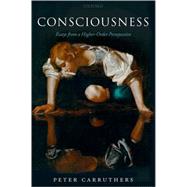Consciousness Essays from a Higher-Order Perspective
, by Carruthers, Peter- ISBN: 9780199277360 | 0199277362
- Cover: Paperback
- Copyright: 8/4/2005
Peter Carruthers's essays on consciousness and related issues have had a substantial impact on the field, and many of his best are now collected here in revised form. The first half of the volume is devoted to developing, elaborating, and defending against competitors one particular sort ofreductive explanation of phenomenal consciousness, which Carruthers now refers to as 'dual-content theory'. Phenomenal consciousness - the feel of experience - is supposed to constitute the 'hard problem' for a scientific world view, and many have claimed that it is an irredeemable mystery. ButCarruthers here claims to have explained it. He argues that phenomenally conscious states are ones that possess both an 'analog' (fine-grained) intentional content and a corresponding higher-order analog content, representing the first-order content of the experience. It is the higher-order analogcontent that enables our phenomenally conscious experiences to present themselves to us, and that constitutes their distinctive subjective aspect, or feel.The next two chapters explore some of the differences between conscious experience and conscious thought, and argue for the plausibility of some kind of eliminativism about conscious thinking (while retaining realism about phenomenal consciousness). Then the final four chapters focus on the minds ofnon-human animals. Carruthers argues that even if the experiences of animals aren't phenomenally conscious (as his account probably implies), this needn't prevent the frustrations and sufferings of animals from being appropriate objects of sympathy and concern. Nor need it mean that there is anysort of radical 'Cartesian divide' between our minds and theirs of deep significance for comparative psychology. In the final chapter, he argues provocatively that even insects have minds that include a belief/desire/perception psychology much like our own. So mindedness and phenomenal consciousnesscouldn't be further apart.Carruthers's writing throughout is distinctively clear and direct. The collection will be of great interest to anyone working in philosophy of mind or cognitive science.






